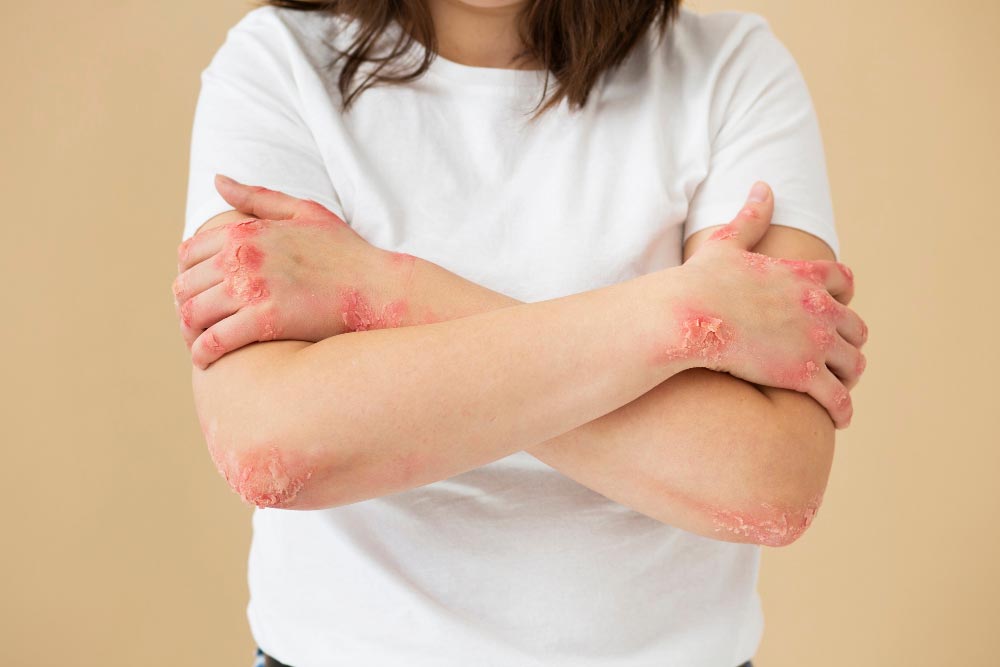Table of Contents
Research says that around 8 million people in the United States have psoriasis, and around 125 million people have this medical condition worldwide.
Psoriasis is an autoimmune disease that causes the fast accumulation of skin cells.
If you have psoriasis, one major symptom that you will experience is scaling. Scaling is caused by a buildup of cells on the surface of your skin. This causes red, itchy, scaly patches on the knees, elbows, trunk, scalp, and other body parts. It is a long-term or chronic skin condition without a cure. It goes through cycles, with flare-ups lasting a few weeks or months, and afterwards, the scaling will subside
What are the common symptoms of psoriasis?
People who have psoriasis have different symptoms depending on the type of the disease affecting them. The following are the top four symptoms for those suffering with psoriasis:
- Rashes or red patches, inflammation of the skin, covered with silver-colored scales. In severe cases. The plaques or the scales grow and merge into each other and might cover a large area of the skin;
- Scaly plaques on the scalp;
- Discoloration of fingernails and toenails. In some cases, the nails begin to decay and detach from the nailbed; and,
- Stiff and swollen joints.
Not every person may experience all these symptoms. Some may experience completely different ones depending on their immune system.
The majority of psoriasis patients go through “cycles” of symptoms.
The sickness may cause severe symptoms for a few days or weeks. The symptoms will then subsequently go away and become nearly unnoticed. If aggravated by a typical psoriasis trigger, the condition may flare up again in a few weeks. Symptoms of psoriasis might sometimes go away entirely.
You may be in “remission” if you don’t have any current psoriasis symptoms. This doesn’t guarantee your psoriasis won’t come back, but it does indicate you’re symptom-free for the time being.
These are the five different types of psoriasis;
- Plaque psoriasis is the most common type. Patients may have red inflammation patches with gray or whitish scales on the skin. These red patches are usually covered with white or silver scales called plaques. This is usually found on the scalp, elbows, or knees.
- Guttate psoriasis is commonly found in children. This type of psoriasis causes small pink or violet spots in the torso, arms, or legs. These spots are thick and have plaque too like plaque psoriasis.
- Pustular psoriasis develops primarily among adults. It causes white, pus-filled blisters and inflamed skin that is red or violet in color, depending on the skin tone. It can appear as a more intense violet tint on darker skin tones. Pustular psoriasis usually affects smaller sections of the body, such as the hands or feet, although it can also affect other parts of the body.
- Inverse psoriasis generates bright red, glossy, irritated skin patches. Inverse psoriasis appears as patches under the armpits or breasts, in the crotch, or around skinfolds in the genitals.
- Erythrodermic psoriasis is a severe and extremely rare form of psoriasis. This shape frequently encompasses significant areas of your body at once. The skin seems to be sunburned.
Scales that form slough off in big sheets or pieces. With this type of psoriasis, you may experience a fever or become quite unwell. Because this type of infection can be fatal, you must schedule an appointment with a medical practitioner as soon as possible.
Is psoriasis contagious?
Psoriasis is not infectious. The skin disease cannot be passed from one individual to another. You will not develop psoriasis by touching a psoriatic plaque on another person. Many people believe psoriasis is contagious. Therefore it’s critical to educate yourself on the condition.
What are the causes of psoriasis?
The cause of psoriasis is unknown to doctors. They do, however, have a basic idea of two essential elements, according to decades of study:
- Immune system
Psoriasis is an autoimmune condition. The body attacks itself, resulting in autoimmune disorders. Psoriasis causes T-lymphocytes, which are white blood cells, to harm your skin cells.
- Genes
Some people are born with genes that make them more susceptible to psoriasis. According to research published in 2019, you are more likely to develop psoriasis if you have a close relative who has a skin problem.
Treatment
Mild condition of psoriasis may be treated at home or change of lifestyle.
- Taking a regular bath may remove plaques and ease the inflamed skin. You may use anti-bacterial soap, and you may use lukewarm water to disinfect your skin.
- Moisturizing your skin after taking a bath improves your skin condition. You may apply it one to three times every day.
- Expose yourself to natural sunlight for 15 up to 30 minutes. A controlled dose of sunlight helps you to improve your condition, but too much may worsen your condition. Use sun protection lotion at least SPF 30.
- Avoid drinking alcohol may reduce the effectiveness of the medication. So as much as possible, avoid drinking alcoholic drinks.
Psoriasis is a non-contagious skin condition. Do not get scared of it. It will not harm anybody around you. Improve your lifestyle by doing regular exercise, eating well-balanced food, getting enough sunrise every day, and practicing clean hygiene. If your condition is getting worse you may enroll in psoriasis clinical trials to help find a possible cure or treatment for the disease.
